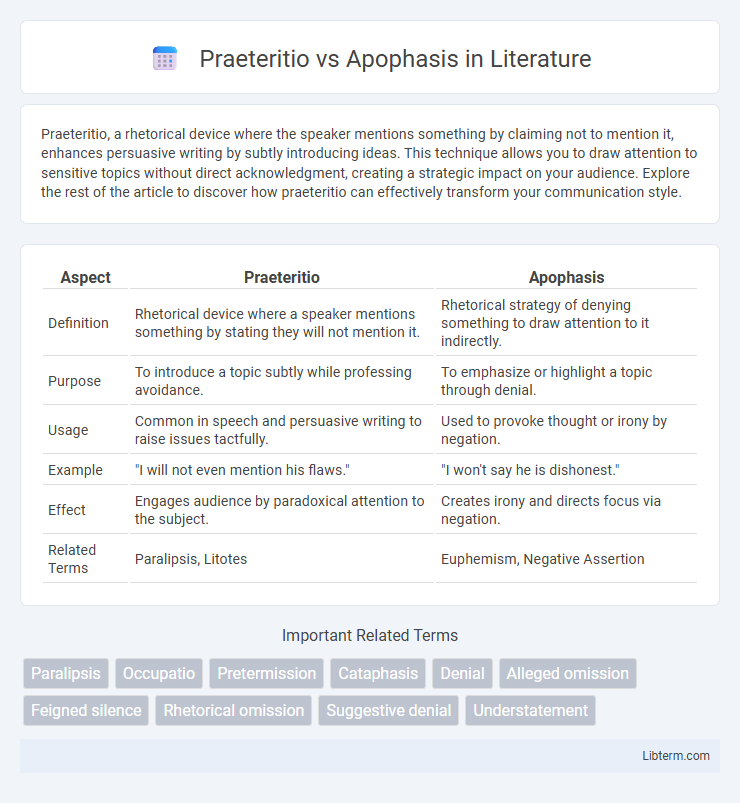Praeteritio, a rhetorical device where the speaker mentions something by claiming not to mention it, enhances persuasive writing by subtly introducing ideas. This technique allows you to draw attention to sensitive topics without direct acknowledgment, creating a strategic impact on your audience. Explore the rest of the article to discover how praeteritio can effectively transform your communication style.
Table of Comparison
| Aspect | Praeteritio | Apophasis |
|---|---|---|
| Definition | Rhetorical device where a speaker mentions something by stating they will not mention it. | Rhetorical strategy of denying something to draw attention to it indirectly. |
| Purpose | To introduce a topic subtly while professing avoidance. | To emphasize or highlight a topic through denial. |
| Usage | Common in speech and persuasive writing to raise issues tactfully. | Used to provoke thought or irony by negation. |
| Example | "I will not even mention his flaws." | "I won't say he is dishonest." |
| Effect | Engages audience by paradoxical attention to the subject. | Creates irony and directs focus via negation. |
| Related Terms | Paralipsis, Litotes | Euphemism, Negative Assertion |
Introduction to Praeteritio and Apophasis
Praeteritio and apophasis are rhetorical devices used to emphasize a point by seemingly passing over it. Praeteritio involves mentioning something by stating that it will not be mentioned, creating a paradoxical effect that draws attention to the subject. Apophasis, often used in political or persuasive speech, subtly introduces an idea or accusation while disclaiming intention to address it, enhancing the speaker's strategic influence.
Defining Praeteritio: Meaning and Usage
Praeteritio, a rhetorical device closely related to apophasis, involves mentioning something by stating that it will not be mentioned, thereby drawing attention to the subject while ostensibly passing over it. This technique is commonly used in political speeches and persuasive writing to introduce sensitive or controversial topics indirectly. Praeteritio enhances rhetorical impact by provoking curiosity and emphasizing the importance of the suppressed information, contributing to refined argumentation strategies in classical and modern discourse.
Understanding Apophasis: Definition and Examples
Apophasis is a rhetorical device where a speaker brings up a subject by denying it or pretending to omit it, effectively emphasizing the point indirectly. For example, saying "I won't even mention his failures" highlights those failures without directly stating them. This technique leverages the power of suggestion to draw attention while maintaining an appearance of restraint or neutrality.
Historical Origins of Both Rhetorical Devices
Praeteritio and apophasis trace their origins to classical rhetoric, with roots in Ancient Greece and Rome. Praeteritio, derived from the Latin term meaning "passing over," was extensively utilized by Roman orators such as Cicero to subtly introduce topics while feigning omission. Apophasis, originating from the Greek word apophasis, was similarly employed by Aristotle and other Greek rhetoricians to imply or emphasize a point by professing not to mention it.
Key Differences Between Praeteritio and Apophasis
Praeteritio and apophasis both involve mentioning a subject by stating it will not be mentioned, but praeteritio typically emphasizes passing over something lightly or intentionally omitting details, while apophasis focuses on highlighting something indirectly through denial or negation. Praeteritio often serves as a rhetorical strategy to introduce a topic subtly, whereas apophasis functions to draw attention by explicitly stating what will not be said, thereby reinforcing the idea. The key difference lies in their rhetorical purpose: praeteritio minimizes or side-steps the subject, while apophasis uses denial to emphasize and underscore it.
Similarities in Structure and Function
Praeteritio and apophasis share a rhetorical structure where the speaker seemingly omits discussing a topic while actually bringing it to the audience's attention. Both figures function by creating indirect emphasis, allowing the speaker to highlight issues subtly or imply critique without overt assertion. This technique effectively manipulates focus and controls discourse by suggesting the importance of the topic through its purported exclusion.
Praeteritio in Political and Legal Discourse
Praeteritio is a rhetorical device frequently employed in political and legal discourse to highlight a point by deliberately stating that it will not be mentioned, thereby drawing attention without explicit assertion. Politicians and lawyers use praeteritio to insinuate accusations or sensitive information while maintaining plausible deniability. This technique strategically influences audience perception by implying knowledge or guilt, shaping arguments subtly without direct confrontation.
Apophasis in Modern Media and Communication
Apophasis, a rhetorical device where the speaker mentions something by professing not to mention it, is prevalent in modern media for subtle persuasion and strategic emphasis. In political speeches and advertising, it enables the introduction of controversial topics indirectly, shaping public perception without direct accusation. This technique's effectiveness lies in its ability to engage audiences by suggesting information while maintaining plausible deniability, making it a powerful tool in contemporary communication strategies.
Tips for Using Praeteritio and Apophasis Effectively
Using praeteritio effectively involves subtly mentioning a topic while pretending to omit it, which can draw attention and pique curiosity. Apophasis works best by denying the intention to discuss something, thereby emphasizing it through negation and often creating irony or sarcasm. Both rhetorical devices require careful balance to avoid sounding passive-aggressive or insincere, ensuring the message remains clear and persuasive.
Conclusion: The Impact of Implicit Communication
Praeteritio and apophasis both employ implicit communication to emphasize points without direct assertion, leveraging the power of suggestion to influence audience perception subtly. These rhetorical strategies enhance persuasive impact by engaging listeners to infer the speaker's intention, making arguments more memorable and psychologically compelling. Understanding the nuanced use of these devices reveals how silence and omission can serve as powerful tools in shaping discourse and guiding conclusions.
Praeteritio Infographic

 libterm.com
libterm.com